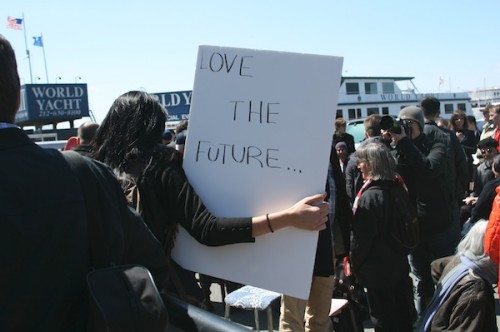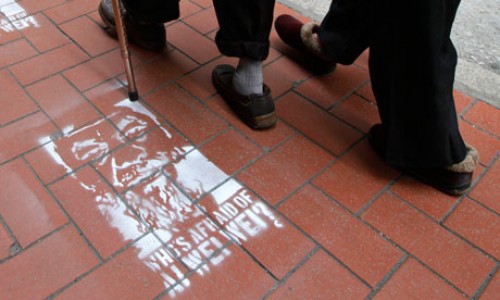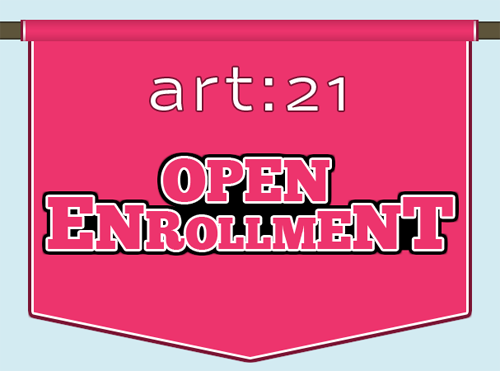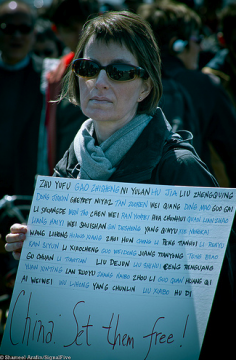The rain finally stopped this past Sunday so that 1001 chairs (or at least a good few hundred of them) could be set up outside Chinese embassies across the globe to protest the detention of artist Ai Weiwei by Chinese authorities. Last seen on April 3, Ai’s forced disappearance is deeply troubling but hardly surprising given China’s record of human rights violations. While the eyes of the world were relentlessly trained on the unfolding events of the Arab Spring, the Chinese government saw a perfect opportunity to make sure activists like Ai weren’t able to galvanize their countrymen and women to similar action, a “jasmine revolution.” This isn’t news to you though. The media coverage has been huge and the level of attention that the situation has garnered is both impressive and necessary. And yet it makes me pause for thought.

A phrase similar in characters and sound to Ai Weiwei’s own name, “Love the Future,” or “Ai Wei Lai,” has become a way to bypass Chinese censorship for netizens. See the Hyperallergic blog (www.hyperallergic.com) for excellent pictures and coverage of the 1001 Chairs protests.
While I wholeheartedly support every column inch generated on his story, I was conflicted about going to the gathering at the embassy in New York. It’s going to sound like intellectual handwringing, but to do so seemed almost like I was taking part in another Creative Time “art event,” a happening, like getting the key to the city or sending off the BHQF on tour. To be sure, the momentum behind Ai Weiwei’s specific case forces broader scrutiny of China’s crackdown. Creative Time, and the many individuals who left their Sunday activities to pick up a chair and head to midtown, acted with integrity and commitment. The photographs, blog posts, tweets, and news reports about this act of solidarity fan out and and echo into the very cyberspace in which Ai has conducted his own activism. Online, his name has morphed into the coded “爱未来 Ai Weilai” to slip past censors, close in look and sound to Ai’s name but meaning “love the future.” It’s this breadth of sentiment that resonates, and also becomes the most powerful iteration yet of Ai Weiwei’s collapse of art into life. As a friend whispered, pained, aware of the non-negotiable nature of being arrested for activism in China, “do we even know that Ai Weiwei wants to be released immediately? This response is more powerful than anything he’s experienced to date.” This is an artist who has always been acutely aware of the parameters he works within in China, and the response his work garners in the West. There is no doubt he wants (and we want him) to be released. But did he also want to be arrested? Can an artist use the political strategies of his government as his own medium, or is this question reaching past the more pressing concern of human rights? What is the wider context of Ai Weiwei’s story? Aside from this meaningful and symbolic gesture, what else can be done in this situation? Who else is impacted by his actions? By ours?
I am, in the end, ineffectively glued to my laptop screen and I spent much of Sunday reading more about Ai and the many others like him who have been arrested without charge, detained without contact with their families, sentenced to “re-education through labor” without recourse to trial, or denied freedom of speech at every turn. I say many – this is only the recent crackdown. China is the country of the Cultural Revolution and, as such, is ingrained with the legacy of internalized, endemic policing of one’s neighbor. As Amnesty International’s Director for the Asia-Pacific, Sam Zarifi, points out bluntly, “if the authorities are so bold as to grab this world-renowned artist in broad daylight at Beijing airport, it’s frightening to think how they might treat other, lesser known dissidents.”

People in Hong Kong walk past street stencils of detained Chinese artist and activist Ai Weiwei. The words 'Who's afraid of Ai Weiwei' are painted underneath. Photograph: Kin Cheung/AP
It strikes me, then, that we must not bypass the other lesser-known names in our (correct) haste to ensure, as Creative Time’s Anne Pasternak said on Sunday, that Ai’s story doesn’t get buried as yesterday’s news. If, through his face, hundreds of others’ faces are conjured, remembered, and respected too, then let’s add their names to the stories circulating in the Western press. Their situation is collective, but they are individuals. Like Ai’s campaign to document student deaths in the 2009 Sichuan earthquake, names matter. Each name, each repetition, demonstrates to the Chinese government and to the world that no one will become yesterday’s news. In light of the plurality of this situation and the many, many other people facing unconscionable psychological and physical brutality, I wanted to take the small space I have here to add some names alongside Ai’s. Who’s afraid of Ai Weiwei? The same people who are afraid of the other 37 individuals who have, as of Amnesty’s latest update on April 12, been criminally detained in relation to the crackdown on the “Jasmine Revolution.” I salute and join with those who call for the Chinese government to free Ai Weiwei. Don’t forget the others too, the majority of whom don’t have an international art community at their backs.
Five— Li Shuangde (李 双德), Chen Wei (陈 卫), Ran Yunfei (冉 云飞), Ding Mao (丁 矛), and Zhu Yufu (朱 虞夫)—have been formally arrested;
Two—Hua Chunhui (华春辉) and Wei Qiang (魏 强)—have since been sent to Re-education through Labor;
Five—Guo Yigui (郭谊贵), Mo Jiangang (莫 建刚), Pan Zhenjuan (潘振娟), Tan Lanying (谈 兰英) and Yang Lamei (杨 腊梅)—have been released;
Nine—Cheng Wanyun (程婉芸), Li Hai (李 海), Li Yongsheng (李 永生), Lan Jingyuan (兰 靖远), Liu Guohui (刘 国慧), Liu Huiping (刘 慧萍), Weng Jie (翁 杰), Zhang Jian’nan (张 健男) and Zheng Chuangtian (郑创添)—have been released on bail to await trial; and
Seventeen—Liang Haiyi (梁海怡), Quan Lianzhao (全 连昭), Wei Shuishan (魏 水山), Sun Desheng (孙 德胜), Yang Qiuyu (杨 秋雨), Xie Mingkai (薛 明凯), Wang Lihong (王 荔蕻), Huang Xiang (黄 香), Zhui Hun (追 魂), Cheng Li (成 力), Guo Gai (郭 盖), Peng Tianhui (彭 天惠), Li Renyu (李 仁玉), Kan Siyun (阚 思云), Li Xiaocheng (李 小成), Guo Weidong (郭 卫东), and Ni Yulan (倪 玉兰) remain in detention.
A total of 16 individuals remain missing. They are: Jiang Tianyong (江 天勇), Teng Biao (滕彪), Gu Chuan (古 川), Li Tiantian (李天天), Liu Dejun (刘 德军), Liu Shihui (刘士辉), Yuan Xinting (袁 新亭), Lan Ruoyu (蓝若宇), Hu Di (胡 荻), Zhang Haibo (张海波), Ceng Renguang (曾 仁广), Zhou Li (周莉), Liu Zhengqing (刘 正清), Ai Weiwei (艾未未), Wen Tao (文 涛), and Dong Jiqin (董继勤).






Pingback: criticismism » Blog Archive » Found Objects 23/04/2011
Pingback: Letter from London | Seeds of Discord | Art21 Blog